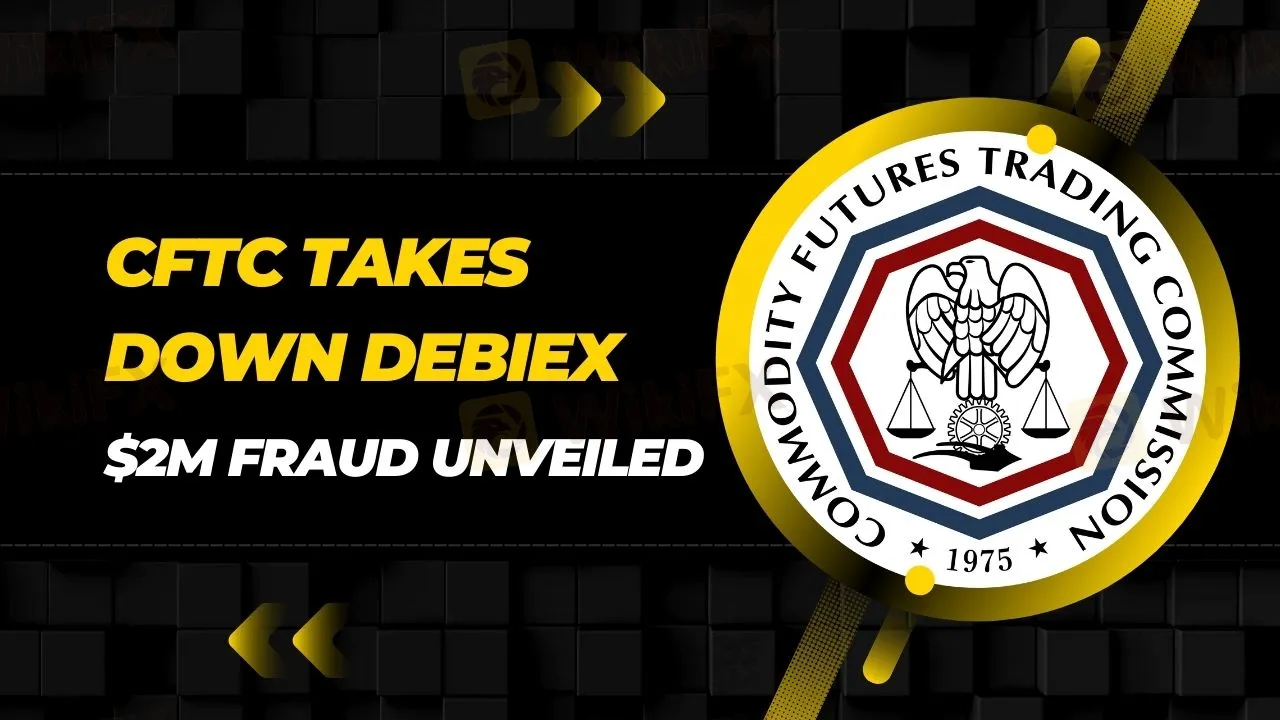简体中文
繁體中文
English
Pусский
日本語
ภาษาไทย
Tiếng Việt
Bahasa Indonesia
Español
हिन्दी
Filippiiniläinen
Français
Deutsch
Português
Türkçe
한국어
العربية
CFTC Takes Down Debiex: $2M Fraud Unveiled
Abstract:The CFTC’s takedown of Debiex unveils a shocking $2M crypto fraud that tricked investors with fake trading platforms and misappropriated their funds.

CFTC Cracks Down on Debiex
The U.S. Commodity Futures Trading Commission (CFTC) has taken decisive action against Debiex, a purported digital asset trading platform accused of committing financial fraud. The U.S. District Court for the District of Arizona issued a default judgment against Debiex on March 13, 2025, after finding the platform guilty of misappropriating over $2 million from customers through deceptive practices.
The judgment not only bars Debiex from trading in any CFTC-regulated markets but also prohibits it from registering with the CFTC in the future. In addition to banning its operations, the court ordered Debiex to pay a $221,466 civil monetary penalty and over $2.2 million in restitution to the defrauded customers.
How the Scheme Unfolded
The fraudulent scheme orchestrated by Debiex was both elaborate and calculated. It relied on the coordinated efforts of multiple groups:
1. Solicitors - These individuals reached out to potential victims via U.S.-based social media platforms, posing as friends or romantic interests. They built trust with the targets before convincing them to open and fund trading accounts on Debiexs platform.
2. Customer Service Agents - Once accounts were set up, fake customer service representatives assisted with account management, creating an illusion of legitimacy and professional support.
3. Money Mules - Individuals like Zhang Chéng Yáng served as intermediaries, using their digital wallets to funnel and misappropriate customer funds. Zhang, believed to be a Chinese national, acted as a conduit for at least one fraudulent transaction, which led to the confiscation of approximately $120,000 worth of digital assets from his wallet.
Fake Trading
Instead of conducting legitimate trading activities, Debiex created a façade of financial operations. The platform displayed fabricated trading data to deceive investors into believing their funds were actively traded and generating profits. In reality, no real trading took place, and all customer funds were siphoned off.
The websites associated with Debiex mimicked legitimate trading platforms to maintain credibility. However, the supposed trading accounts were nothing but a ruse designed to lure more investments. The platforms administrators continuously persuaded customers to make additional deposits, promising higher returns and more significant opportunities.
Recovery Challenges Remain: Be Cautious When Choosing Platforms
The aftermath of Debiexs fraudulent scheme has left numerous victims financially devastated. Despite the court ordering restitution, the CFTC has warned that recovering lost funds might be unlikely due to the possible lack of remaining assets from the perpetrators.
Investors should take this case as a stark reminder to exercise extreme caution when selecting digital asset platforms. It is vital to thoroughly investigate a platforms credibility and regulatory status before committing any funds. Rather than focusing solely on post-fraud recovery, prioritizing precaution and due diligence can significantly reduce the risk of financial loss.
Disclaimer:
The views in this article only represent the author's personal views, and do not constitute investment advice on this platform. This platform does not guarantee the accuracy, completeness and timeliness of the information in the article, and will not be liable for any loss caused by the use of or reliance on the information in the article.
Read more

Georgia Man Charged in Danbury Kidnapping and Crypto Extortion Plot
Georgia man James Schwab charged in Danbury kidnapping tied to $230M crypto heist. Plot targeted couple for ransom after Miami altercation with son.

Galaxy Digital Settles $200M in Luna Token Manipulation Case
Galaxy Digital pays $200M to settle Luna token manipulation probe by NY regulators, linked to TerraUSD’s 2022 crash, impacting crypto market stability.

Common Tactics Used in Online Trading Fraud Today
Know the top online trading scams of 2025, from fake apps to pump-and-dump tricks. Simple tips to spot and avoid them, keeping your money safe in this easy guide.

BaFin Issues Warnings Against Unauthorized Financial Service Providers
Brahams & Goldbach, Fluxion Ltd, and Edelraum.net face regulatory warnings from BaFin for providing unlicensed investment and crypto services.
WikiFX Broker
Latest News
Exposing the Top 5 Scam Brokers of March 2025: A Closer Look by WikiFX
Gold Prices Climb Again – Have Investors Seized the Opportunity?
Webull Launches SMSF Investment Platform with Zero Fees
Australian Regulator Warns of Money Laundering and Fraud Risks in Crypto ATMs
The Withdrawal Trap: How Scam Brokers Lure Victims into Paying More
FCA to Investors: Think Twice Before Trusting These Brokers
Trump\s tariffs: How could they affect the UK and your money
Trump gambles it all on global tariffs he\s wanted for decades
TradingView Brings Live Market Charts to Telegram Users with New Mini App
HTFX Spreads Joy During Eid Charity Event in Jakarta
Currency Calculator







